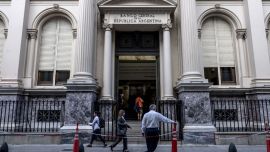Victoria Basualdo is one of Argentina’s most respected researchers and historians, one who has devoted hours upon hours toward investigating the repression suffered by grassroots union organisations and workers prior to and in the aftermath of the 1976 coup that brought the military junta to power.
She is currently a researcher with Argentina’s National Scientific and Technical Research Council (CONICET) and at the national branch of the Latin American School of Social Sciences (FLACSO), specialising in the economy and technology.
Basualdo, who holds a PhD from Columbia University, was one of the main figures behind the landmark 2015 report Corporate liability on crimes against humanity. Repression against workers during the era of state terror – produced by the Centre for Legal and Social Studies (CELS), FLACSO and the Justice Ministry.
During the recent trial addressing complicity with the military dictatroship and crimes committed against employees at the Ford motor company’s sites in Argentina, she was called to testify as an expert witness, along with Eduardo Basualdo, Silvio Feldman, Federico Vocos and Claudia Bellingieri.
How did Ford, the company, cooperate with the repression and persecution suffered by its own employees?
This trial faced the immense challenge of examining not only the responsibility of the members of the Armed Forces [such as former Army general, Santiago Omar Riveros], but also the culpability of some of the company’s executives, such [factory manufacturing director] Pedro Müller and [factory security manager] Héctor Sibilla. The company’s former president and the labour relations manager were also to face charges but they died before the trial started.
Thanks to invaluable documents, maps and testimonies, it was possible to reconstruct these “repressive corporate practices” that took place at the factory in the mid-1970s. These included the submission of lists of workers’ names, along with key information from files and photos, food and infrastructure supply and the use of the company’s vehicles to kidnap workers. Abductions, in many cases, occurred at the workplaces and some of the workers were even held and tortured [at a site] within the company’s premises.
Abductions started at the Ford plant on the same day as the 1976 coup. What were industrial workers a target for the dictatorship?
The testimonies [given in court] clearly showed that during the first half of 1970s there was an impressive organisational process at the plant within the SMATA automotive industry workers’ union. Despite intense rifts within the union, delegates questioning the company’s management, and confrontation among union leaders, they were able to achieve significant labour rights and to incorporate a great number of workers into the SMATA union. For instance, those working at the canteen, who were admitted to the union in 1975 and were among the first to be kidnapped from their workplaces… the rights they had achieved started to be eliminated, one by one.
In the minutes, taken during meetings of the board of directors, there are references to an increase in productivity and a drop in absenteeism during the second semester of 1976. Can we assume that the abductions also played a disciplinary role within the plant?
Of course, one can think of a disciplinary role, in many ways. Imagine the impact of being present during the kidnappings of workers at their own place of work, seeing how members of the security forces take colleagues, in front of the rest of the workers, and the desperation of not being able to do anything. To fear for one’s own life and for the one’s family, of not knowing if people are going to return or not. But, in addition, the kidnapping of delegates accompanied a process of dismantling the entire union structure that had been built in the previous years in the factory, which was initially frozen and completely reoriented in later times. And, of course, kidnappings have an immediate effect on the conditions and intensity of the work.
Do you think that these sentences against Müller and Sibilla will mark a turning point? To stop discussions about the complicity of businesses and instead refer to the corporate liabilities for working with the criminal plans of the last military dictatorship?
I answer, as the historian that I am, without pretending to enter into the field of law – that is not my field. The ruling – we do not yet have the grounds [published] – effectively recovers the character of “necessary participants” such as Müller and Sibilla in human rights violations. This places these “repressive corporate practices” not in a position of having accompanied a principal action of the repressive forces, but gives them their own weight, as necessary components [that took place in order] for this repression to have developed.
Why do you think it took so long for for the justice system to take an interest in what happened to workers during the last dictatorship?
There has been a record of what happened at Ford during the dictatorship from National Commission on the Forced Disappearance of Persons (Conadep) and the Trial of the Juntas, but it was indeed difficult to show the importance given by the military forces and companies to union activism and its impact.
Analysing these cases leads not only to understanding the importance of the working class as a historical subject, but also to the examining the role of economic power, of companies and business leaders in repressive processes, an issue that faces a great deal of resistance [from the firms involved] because they are central core of power. This makes progress in these cases very costly, and that’s part of the significance of this judgement.























Comments